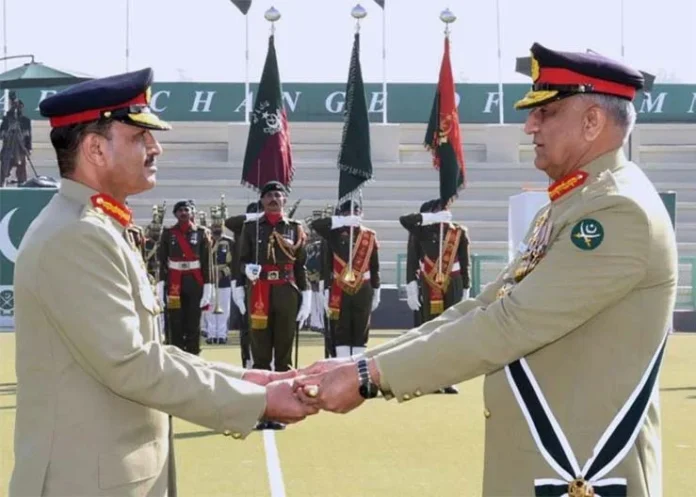Gen. Asim Munir took over as Pakistan’s new army chief on November 29 when the country is passing through great political and economic commotion. It faces the risk of an economic amidst shrinking foreign exchange reserves, which currently stand at just $7.4 billion. Political mayhem is likely to increase further in the coming time and may challenge the military establishment’s so-called apolitical approach.
One of the key areas of attention for Gen. Munir would be handling Pakistan’s internal security situation, which is worsening day by day. For this he needs to handle the TTP and Baluchistan questions cautiously, while also improving his relationship with his Indian counterparts and also manage the relationship with the US and China.
In this, the talks or outreach with Tehreek-e-Taliban Pakistan (TTP) and Baluchistan are the most significant. TTP ended the June ceasefire and urged its fighters to carry out attacks across Pakistan, just a day before the new army chief took over.
TTP describes these attacks as retaliation since the suspension of peace talks in July, but the recent suicide attack in Baluchistan marks a paradigm shift in TTP’s philosophy. Earlier the majority of TTP’s attacks were confined to the ex-FATA region and Khyber Pakhtunkhwa, but the new dictate is to hit targets across Pakistan and shift from the defensive to an offensive strategy.
Government’s talks with the TTP have failed twice and military operations have produced mixed results. The TTP’s sanctuaries in Afghanistan under the Taliban’s patronage have further increased Pakistan’s internal security quandary. This may further reduce the tactical efficacy of operations against the TTP fighters, as they may escape to Afghanistan and resume attacks once the operation is slowed or halted. In this context, Pakistan may decide to decapitate the TTP leadership and increase surgical strikes, using drones, under its revised CT policy.
Therefore, it will be crucial to observe how Gen. Munir will define the mandate and rationale of his offensive, given that the threat is externally directed from Afghanistan.
Presently, there is no ownership of CT policy in Pakistan. The parliament’s National Security Committee in September revived the Apex Committees, which were constituted in 2015, for better CT coordination of various state institutions, giving the National Counterterrorism Authority a lead policy role, as well as strengthening the CT infrastructure at the federal and provincial levels. But the new army chief’s policy will be the key determinant of how Pakistan’s CT response will evolve in the coming years.
Meanwhile, another key area of attention for the new army chief would be handling ethno-separatist insurgency in Baluchistan, which has transformed from a low-intensity conflict to a protracted threat, which has increased its offensive capabilities. The new generation of Baloch separatists is more radical, carries no tribal baggage, buys into a more austere version of Baloch nationalism and has no inclination towards dialogue.
In addition, Gen. Munir will need to focus on TTP’s reconstituted networks in the ex-FATA region and southern Khyber Pakhtunkhwa along with further improving the ongoing clearance operation in Baluchistan. In addition, he’ll have to build a non-military counter narrative to handle both the TTP and Baluch separatists. In the past also, such initiatives have failed due to the absence of non-military responses, which should be used to challenge the ideological narrative of extremist groups besides providing robust counter-narratives.
Another key area, which will need Gen. Munir’s attention is to improve the military’s image among the Pakistani people. Historically, the army has directly ruled Pakistan for more than 30 of its 75 years as an independent nation and is considered the country’s chief arbiter in domestic matters, whether in power or not. Boosting the morale of the military’s rank and file should be a priority for Munir, which is not a big task if approached with a professional approach.
Historically, India has always been Pakistan’s main rival, involving the militaries of both nations. The two nuclear powers have fought two of their three full-scale wars over Kashmir, and frequently blame each other’s military intelligence for armed attacks on their soil.
In early 2019, they were on the verge of another war after India blamed Pakistan for a deadly attack in Indian-administered Kashmir and responded with an air raid across the border.
Frequent skirmishes along their Himalayan border followed until March 2021 when the two countries decided to follow a ceasefire agreement signed in 2003.
Days after he took over as army chief, Munir visited Pakistan-administered Kashmir, where he pledged to “defend every inch of our motherland”. These sorts of statements will not go down well with the Indian establishment and he may need a better nuanced approach to engage with India, for any positive outcome.
Another key area of focus for Gen. Munir would be balancing Pakistan’s ties with both, the U.S. and China, as in the recent past it has tried maintain close ties with both countries. Though in the last decade or it has tended to rely on its north-eastern neighbour more, with Chinese investment running into billions of dollars pouring in for various projects across Pakistan.
-The writer is a Delhi-based political commentator. The views expressed are of the author and do not necessarily reflect the views of Raksha Anirveda
-The writer is a New Delhi-based senior commentator on international and strategic affairs, environmental issues, an interfaith practitioner, and a media consultant. The views expressed are personal and do not necessarily carry the views of Raksha Anirveda






